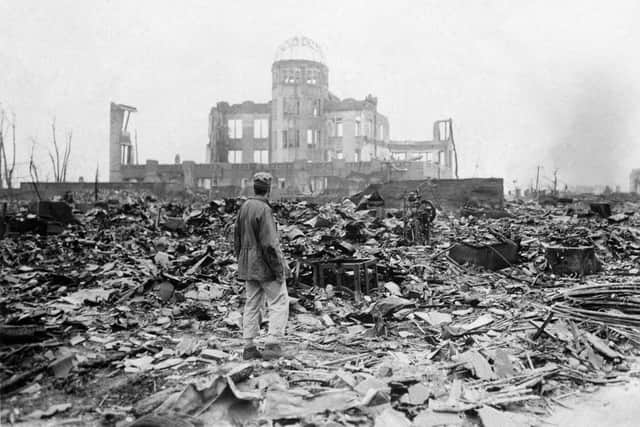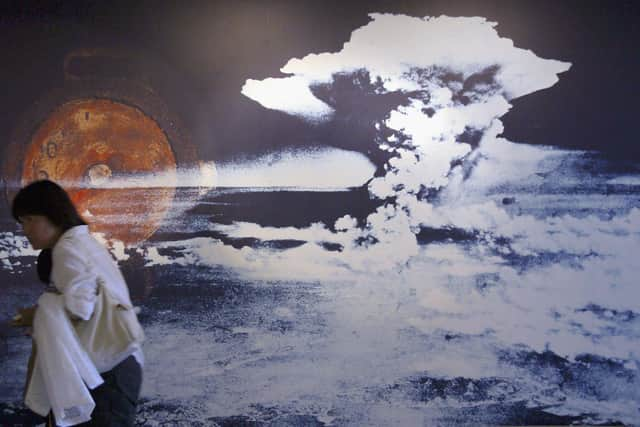VJ Day 75: Forces that led to horrors of war are still with us today - Nick Baines, Bishop of Leeds
For, in the famous words at the end of Bertolt Brecht’s play The Resistable Rise of Arturo Ui, pointing to Hitler, “The bitch that bore him is in heat again.” Not elegant, but inescapably powerful.
The sort of idolatries and dehumanising perversities that led to two world wars have not gone away, and there is great danger in thinking that we have since then just “moved on”.
Advertisement
Hide AdAdvertisement
Hide AdOne of the most remarkable things about what followed VJ Day in 1945 was the ability of so many victims of Japanese military brutality to face the horrors they had endured and still forgive. Not everyone, clearly.


And no one can point a finger at those whose suffering took them into silence, withdrawal or, even, hatred.
Yet, many did recognise the complex nature of human identity, allegiance and obedience.
One of the best illustrations of this can be seen in the film The Railway Man in which Colin Firth plays ex-POW Eric Lomax as he confronts the tortures he had endured during the war.
Advertisement
Hide AdAdvertisement
Hide AdThis is not easy stuff. The German theologian Dietrich Bonhoeffer, hanged on Hitler’s orders a month before the Nazi surrender, addressed this when he rejected any notion of what he called “cheap grace”.


You can’t just “forgive and forget” as a way of dealing with appalling cruelty or suffering; but, the beginning of any healing is to be found in facing the offence with courage and clarity.
A Japanese theologian called Kosuke Koyama did just that in 1984.
Soaked in Japanese tradition and culture (though by then teaching in New York City), he wrote what he called a “pilgrimage in theology’ in which he went from Mount Fuji to Mount Sinai – from the heart of Japanese emperor worship back to the formative place of encounter in the Judeo-Christian narrative with God.
Advertisement
Hide AdAdvertisement
Hide AdWhat this meant for Koyama was not just some interesting historical study from which he could maintain academic distance, but an open facing up to personal challenge and failure.
In a nutshell: how did he find himself seduced by a cultural worldview that led to unimaginable cruelty (as an exercise of power) while at the same time claiming to be a follower of Jesus Christ?
I mention Koyama because his account is not one that should be restricted to Japanese or Germans in the wake of a world war.
It was a failure to recognise early enough the perversity of idolatry (of Hitler, the Reich, the Emperor) or the consequences of a thinking that dehumanises people that led to 50 million corpses across the planet in 1945.
Advertisement
Hide AdAdvertisement
Hide AdAn uncritical obedience to the Emperor cult led not only to extreme violence, but also to Hiroshima and Nagasaki where national identity and racial personality were reduced to ashes beneath the mushroom clouds of technological progress.
Worship idols of national identity or racial supremacy and it will end in violence.
Do we never learn from history?
Koyama came to the conclusion that Japan’s collusion with emperor worship was a form of idolatry – giving ultimate worth to a dehumanising ideology.
He pleads that every culture is prone to similar idolatries and that these are easily colluded with.
Advertisement
Hide AdAdvertisement
Hide AdThe challenge for us, learning from his experience, is how to critique the values of our own culture, in order to avoid unthinkingly slipping down a slope that leads inexorably to violence.
Self-criticism is not something that most of us find easy. Especially when we are asked to expose to external critique something as fundamental as our worldview: that is, our assumptions about the world, its people and what ultimately matters.
It takes courage to look through the lens of others at the essence and drift of what we hold to be essential about our own collective values.
The moral questions that lead us to condemn war crimes are the same as those we bring to bear on current challenges such as illegal immigration: what is a human being worth? And why?
Advertisement
Hide AdAdvertisement
Hide AdI can’t go with Koyama from Mount Fuji back to Mount Sinai where the Judeo-Christian ethical tradition is rooted (the Ten Commandments and the shaping of a just society), but I can at least see in Sinai some fundamental encouragements and warnings: to love God and neighbour; to avoid coveting and killing; to avoid idolatry and build justice; to tell the truth.
VJ Day celebrates the end of a particular dehumanising brutality and the cost of resisting it.
The values that led the world to oppose tyranny must be the ones we hold onto as they come under pressure in every generation.
Rt Revd Nicholas Baines is the Bishop of Leeds
Editor’s note: first and foremost - and rarely have I written down these words with more sincerity - I hope this finds you well.
Advertisement
Hide AdAdvertisement
Hide AdAlmost certainly you are here because you value the quality and the integrity of the journalism produced by The Yorkshire Post’s journalists - almost all of which live alongside you in Yorkshire, spending the wages they earn with Yorkshire businesses - who last year took this title to the industry watchdog’s Most Trusted Newspaper in Britain accolade.
And that is why I must make an urgent request of you: as advertising revenue declines, your support becomes evermore crucial to the maintenance of the journalistic standards expected of The Yorkshire Post. If you can, safely, please buy a paper or take up a subscription. We want to continue to make you proud of Yorkshire’s National Newspaper but we are going to need your help.
Postal subscription copies can be ordered by calling 0330 4030066 or by emailing [email protected]. Vouchers, to be exchanged at retail sales outlets - our newsagents need you, too - can be subscribed to by contacting subscriptions on 0330 1235950 or by visiting www.localsubsplus.co.uk where you should select The Yorkshire Post from the list of titles available.
If you want to help right now, download our tablet app from the App / Play Stores. Every contribution you make helps to provide this county with the best regional journalism in the country.
Sincerely. Thank you.
James Mitchinson
Editor
Comment Guidelines
National World encourages reader discussion on our stories. User feedback, insights and back-and-forth exchanges add a rich layer of context to reporting. Please review our Community Guidelines before commenting.